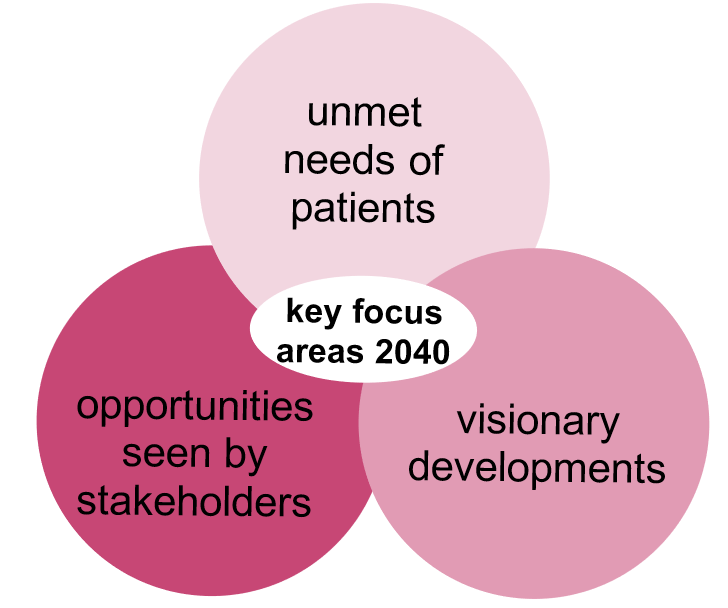Background
In the Netherlands more than a million people live with a rheumatic disease. Rheumatic diseases can have a high impact on daily life: many patients deal with pain, fatigue, difficulty moving and the subsequent effect on their enjoyment and functioning. The Dutch Arthritis Foundation (ReumaNederland) aims to improve the quality of life of those affected by rheumatic diseases, with research into better treatments, reliable information and attention to the interests of people with rheumatism. Aiming to optimise the impact of their the actions for those affected, ReumaNederland wanted to base their strategy until 2040 on the unmet needs of patients, while combining these with the opportunities seen by all stakeholders involved: health professionals, researchers, government and more. To make this a reality, the Athena Institute was asked to lead the process.
Objectives
The objective of this project was to bring together a variety of patients and other stakeholders to identify the challenges of those affected by rheumatic diseases, the opportunities seen by many stakeholders into strategic aims that create space for innovative thinking. The aims are the pillars on which the policy of ReumaNederland will be based until 2040.
Approach and Athena’s role
Athena designed and facilitated a multi-phased process to gain insights into the views of patients and the various other stakeholders and to incorporate these into strategic aims.
During the first phase, interviews were held with a selection of ‘key experts’ from different field (such as leading researchers, patient representatives, etc.) to gain a first understanding of whom to involve and speak to in the following months. We then invited people with various types of rheumatic diseases to group discussions: what challenges do they face in their daily lives with a rheumatic disease? What needs do they have to help face or solve these challenges? Starting the process with people with rheumatic disease put their needs at the foundation of the dialogues with other stakeholders that followed.
During a series of dialogue sessions we asked health care professionals, government, insurance companies, investors, researchers and labour-, and education representatives what opportunities they saw to improve the life of those with rheumatic disease, and the role that ReumaNederland could play in this.
To investigate what challenges and opportunities were found most important, we then set up a survey. More than 2000 respondents gave their input, and this resulted in a list op topics that patients and other stakeholders felt deserved attention from ReumaNederland.
In addition to facilitation of the dialogue sessions, Athena continuously analysed and interpreted the collected data. During weekly sessions with ReumaNederland, the process was discussed and ReumaNederland was provided with information on the views of the field.
As all conversations and dialogue sessions during this project had to be done under the COVID-19 restrictions, the research team had to get creative and involve all people with online tools. Using video conferencing and digital drawing and brown-paper tools, we were able to have interactive sessions at a distance.
